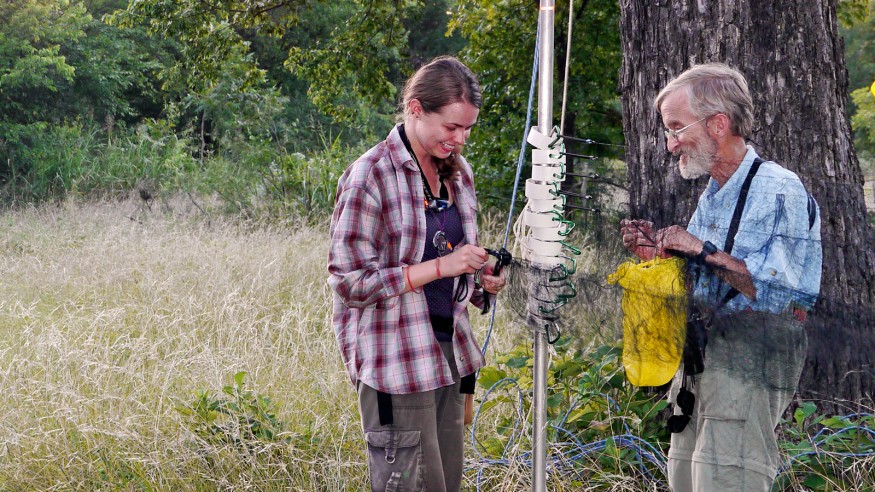
Ohio Wesleyan Alumna Earns National Science Foundation Fellowship
OWU alumna Kristen Lear, Class of 2011, spent summers conducting research on how bats could help control insects that damage pecan orchards in Texas. That research, conducted under the supervision of OWU professor Jed Burtt, previously helped Lear to earn a Fulbright Scholarship and now a 2014 National Science Foundation Graduate Research Fellowship. (Photo courtesy of Jed Burtt)
DELAWARE, Ohio – During her four years at Ohio Wesleyan University, Kristen Lear of Cincinnati participated in hands-on scientific research that helped her to net a Fulbright Scholarship as a senior and, now, a National Science Foundation Graduate Research Fellowship.
Lear, a 2011 OWU graduate and pre-professional zoology major, spent two summers at Ohio Wesleyan researching Evening Bats in Texas. Her work involved determining the style of house that attracted the most bats to live near the region’s pecan orchards. The bats help to control destructive, boring insects and reduce the need for chemical pesticides to protect the valuable trees.
Lear’s Fulbright Scholarship enabled her to live and work for a year in Naracoorte Caves National Park in South Australia. There, she collaborated with researchers seeking to develop an automated counting system for critically endangered Southern Bent-wing Bats using thermal-imaging cameras and missile-tracking software.
Her newly awarded National Science Foundation (NSF) Graduate Research Fellowship will support her enrolling in the University of Georgia’s Warnell School of Forestry and Natural Resources to pursue a Ph.D. in Integrative Conservation.
The highly competitive NSF fellowship includes a three-year annual stipend of $32,000, a $12,000 cost-of-education allowance, opportunities for international research and professional development, and opportunities for Lear to conduct original research at the University of Georgia. Of the more than 14,000 applications received by the NSF for 2014 fellowships, only 2,000 candidates earned awards – including OWU graduating senior Mary Ann Lee and 2013 OWU alumnus Brad Turnwald.
“I will be continuing my work with bats that I began while at OWU during my summer research and Senior Honors project in Texas and that I pursued during my Fulbright Scholarship in Australia,” said Lear, who also earned a Graduate School Assistantship from the University of Georgia. “My general interest is in bat ecology, and, more specifically I am interested in studying how bats provide vital ecosystem services in agricultural landscapes, and how farmers can incorporate bats and other natural pest controllers into their management strategies.
“Recently, I have become interested in migratory bats and cross-border conservation issues,” Lear explained. “For example, how can we manage and conserve bats in neighboring countries (e.g. the U.S. and Mexico) so that the bats still provide vital ecosystem services such as pest control and pollination to farmers on both sides of the border?
“I am very excited to continue my work with bats and pursue research that has implications for both bat conservation and agriculture,” she concluded. “While I am still unsure what my ultimate career objective is, it will definitely involve working with bats and bat conservation.”
Ohio Wesleyan President Rock Jones, Ph.D., said he is confident Lear will succeed in and help to advance any scientific endeavor she undertakes.
“Kristen already has made a difference in her efforts to protect bats and promote them as vital to curbing the use of chemical pesticides,” Jones said. “As an OWU student, she earned a university-funded Theory-to-Practice Grant to support her research and set the stage for earning her Fulbright Scholarship and National Science Foundation Graduate Research Fellowship. I am excited that Ohio Wesleyan was able to provide this life-changing experience for Kristen.”
Since 2009, Ohio Wesleyan has awarded over $1 million in Theory-to-Practice Grants, enabling more than 500 OWU students, faculty, and staff to conduct research or complete special projects in 12 world regions, 55 countries (including the United States), and 22 U.S. states/territories (including Ohio). Learn more about the grant program at https://www.owu.edu/academics/the-owu-connection/theory-to-practice-grants/. Learn more about science education and other academic opportunities at Ohio Wesleyan at www.owu.edu.
According to the National Science Foundation, it has received more than 500,000 Graduate Research Fellowship applications since 1952, but funded only about 46,500. More than 30 of the fellowship recipients later became Nobel laureates, and more than 440 have become members of the National Academy of Sciences. Learn more at www.nsfgrfp.org.
The Fulbright Scholar Program, sponsored by the U.S. Department of State, is the largest U.S. international exchange program for students, scholars, and professionals in the world. Founded in 1946, it currently operates in more than 155 countries. Learn more at www.cies.org.
Founded in 1842, Ohio Wesleyan University is one of the nation’s premier liberal arts universities. Located in Delaware, Ohio, the private, coed university offers more than 90 undergraduate majors, minors, and concentrations, and competes in 23 NCAA Division III varsity sports. Ohio Wesleyan combines a challenging, internationally focused curriculum with off-campus learning and leadership opportunities to connect classroom theory with real-world practice. OWU’s 1,850 students represent 42 states and 37 countries. Ohio Wesleyan is featured in the book “Colleges That Change Lives,” listed on the 2013 President’s Higher Education Community Service Honor Roll with Distinction, and included in the U.S. News & World Report and Princeton Review “best colleges” lists. Learn more at www.owu.edu.
